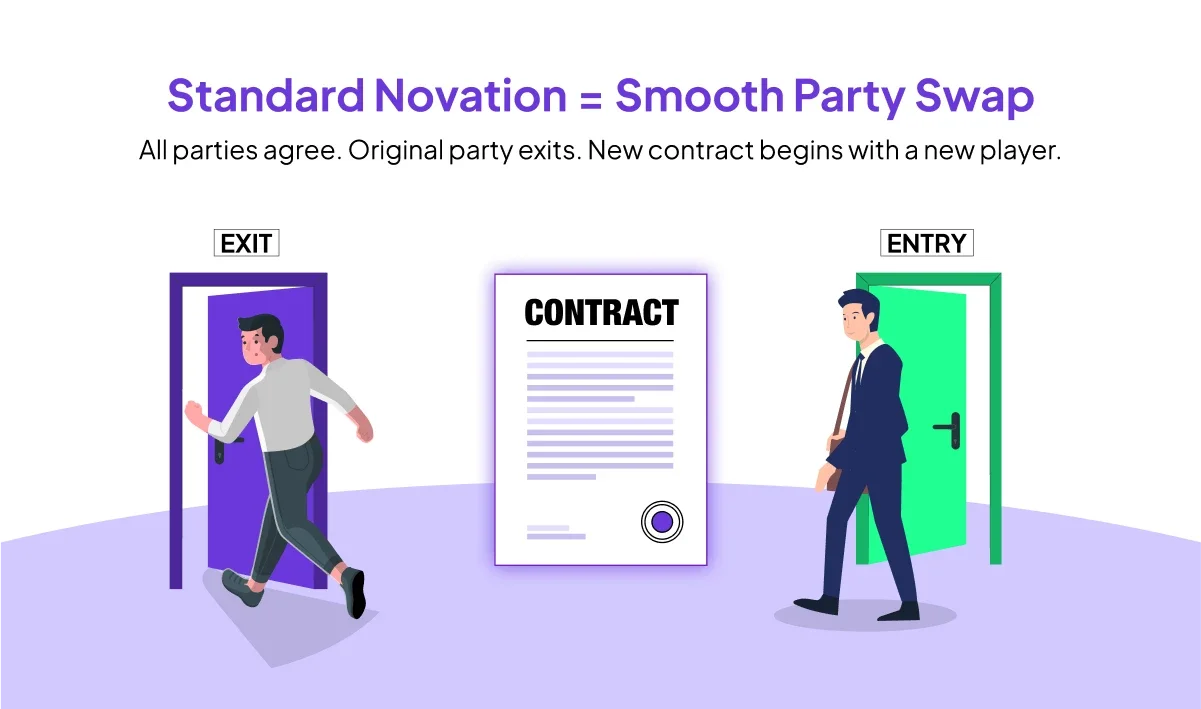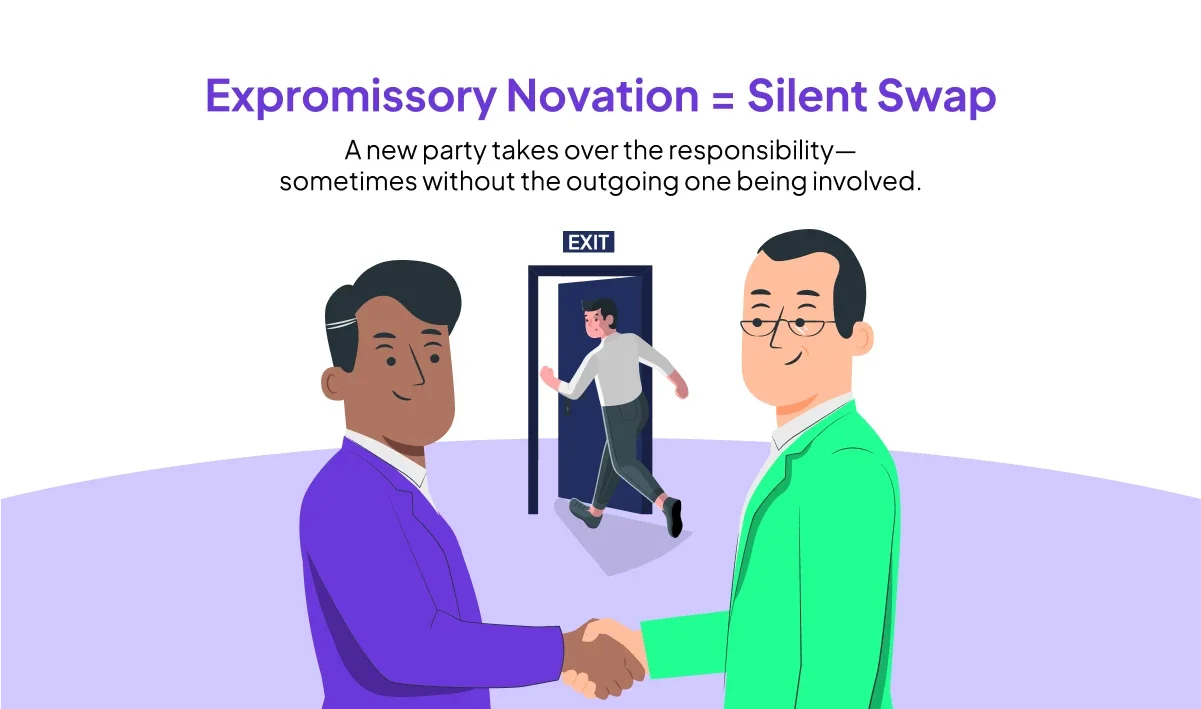Contracts are fundamental to the operation and success of businesses. They outline obligations, manage risks, and define relationships clearly. Think of contracts as the rules of engagement that guide and protect each party involved. Yet, as the business world is dynamic and constantly evolving, the original agreements made in the early stages may not always align with current needs or strategic directions.
Circumstances change, partnerships shift, and what once seemed ideal might now feel limiting or outdated. This is precisely where the concept of novation becomes incredibly valuable, providing a structured and legally sound way to transition contractual obligations smoothly to new parties.
Understanding novation is therefore essential for any growing business aiming to remain flexible, efficient, and responsive in managing their contractual relationships.
What is Novation in Contract Law?
Novation is a legal mechanism used to substitute an existing contract with a new one, replacing one of the original contracting parties with a completely new party. It differs significantly from contract amendments or modifications because novation doesn't merely alter the original contract—it completely extinguishes the old agreement and replaces it with a brand new contractual arrangement.
To illustrate, imagine leasing office space from Company A. Suppose Company A sells the building to Company B. Through a novation agreement, your lease with Company A ends entirely, and a new lease is created directly between you and Company B. Legally, the obligations under your original contract with Company A no longer exist, giving rise to new obligations under the new agreement with Company B.
Types of Novation
When it comes to novation, there are a few different types. Let’s break them down in a simple way with examples to make each one easy to understand:
Standard Novation
This is the most common and straightforward form. It means all three parties involved—the one leaving the contract, the one staying, and the new one joining—agree to the change. The original contract ends, and a new one begins with the new party.
Example: You run a design agency and have a contract with Client A. Midway, you decide to sell your agency to another business. You, Client A, and the new owner all agree to transfer the contract. Now, the new owner continues the work under a new agreement, and you’re officially out of the picture.
Expromissory Novation
This type is slightly different and less common. A third party steps in and agrees to take on the contract, even if the original party being replaced isn’t actively involved in the process. It’s useful when the outgoing party wants to keep things simple and step away without too much back-and-forth.
Example: Let’s say Bob owes money to Alice. Carol agrees to pay Alice on Bob’s behalf and Alice accepts. If Bob isn’t actively involved in finalizing the new agreement but everyone agrees to the switch, it's an expromisory novation. Bob’s role ends, and Carol is now responsible for the payment.
Delegation or Assignment (Not the Same as Novation)
While it may sound similar, assignment is not novation. In an assignment, one party passes on some responsibilities or benefits to another, but the original contract still exists. The original party might still be liable if things go wrong, unless they’re specifically released.
Example: Imagine you’re a freelance writer with a contract to deliver 10 articles. You get too busy and assign another writer to help. The client agrees, but if the new writer misses deadlines or delivers poor work, you’re still responsible unless the client has officially released you from the contract through novation.
Knowing the differences between these types of contract changes helps businesses choose the right path based on the situation. Whether you're restructuring, selling, or stepping away, the right approach ensures smooth transitions and avoids legal complications.
Read Blog: Contract vs Agreement: Everything you Need to Know!
Detailed Process: How Does Novation Work?
The novation process typically involves three crucial steps:
- Mutual Consent: Explicit agreement and clear consent from all involved parties are essential to validate a novation agreement legally.
- Complete Termination of Original Contract: Unlike contract amendments, novation fully terminates the original contract and its associated obligations.
- Establishment of a New Contract: The new agreement explicitly details obligations, rights, and conditions agreed upon by the new set of parties involved.
Clear communication, thorough documentation, and meticulous attention to detail are fundamental to ensuring novation agreements are legally sound and dispute-free.
Strategic Uses of Novation
Novation offers multiple strategic benefits, such as:
- Business Restructuring: Ideal for mergers, acquisitions, or corporate restructuring, novation facilitates seamless contractual transitions.
- Effective Risk Transfer: Allows businesses to strategically transfer risks and liabilities associated with ongoing contracts.
- Compliance and Adaptation: Ensures contracts align with evolving regulatory requirements by updating involved parties accordingly.
- Enhanced Stakeholder Relationships: Clarifies and strengthens contractual relationships, minimizing misunderstandings and enhancing cooperation.
For example, a software development firm merging with another technology enterprise can use novation to efficiently manage contract transitions without disruptions or breaches.
Practical Example of Novation
Consider this practical scenario:
Anna contracts John's construction firm to build a commercial complex. Midway through the project, John sells his business to Sarah’s construction enterprise. A novation agreement is executed, whereby Anna, John, and Sarah agree to terminate the original contract. John’s firm is released from further obligations, and Sarah’s enterprise assumes responsibility to complete the construction. Anna retains continuity in the project without renegotiating all contract terms from the beginning.
Facilitating Novation with Modern Digital Tools
Managing novation efficiently requires transparent, secure, and clear documentation. Digital solutions such as ZoopSign’s Deal Room significantly enhance the novation process by offering a secure, collaborative digital environment for handling novation agreements.
Read Blog: How to Write a Business Contract: 5 Easy Steps
How ZoopSign’s Deal Room helps businesses:
ZoopSign deal room helps businesses in several ways:
- Safeguard novation documentation securely.
- Provide comprehensive audit trails, essential for regulatory compliance.
- Enable seamless collaboration among involved parties, simplifying complex negotiations and documentation processes.
Digital solutions like these help reduce risks, streamline processes, and maintain clarity in complex contractual transitions.
Best Practices for Effective Novation
Successful novation implementation hinges on adopting best practices:
- Comprehensive Documentation: Explicitly document all terms, obligations, and intentions to mitigate potential disputes.
- Legal Guidance: Consult legal experts early and throughout the process to ensure compliance with all relevant regulations and laws.
- Transparent Communication: Clearly communicate novation’s rationale and expectations among stakeholders to ensure transparency and understanding.
- Digital Management: Utilize digital platforms to simplify document handling, approvals, and record-keeping.
Following these practices ensures contractual continuity and minimizes risks during business transitions.
Also Read our Blog: Discharge of Contract: Meaning and Types
Common Pitfalls to Avoid
Businesses must remain cautious to avoid common novation pitfalls, including:
- Ambiguous Terms: Ambiguity or insufficient clarity can result in misunderstandings and legal complications.
- Incomplete or Missing Consent: Any absence of explicit consent from involved parties invalidates the novation process.
- Poor Documentation: Inaccurate, incomplete, or improperly stored documentation complicates enforcement and increases risks.
Proactive planning, careful drafting, and meticulous record-keeping are essential to prevent these issues.
Novation vs. Assignment: Crucial Differences
Clearly distinguishing novation from assignment is crucial for effective contract management:
- Novation entirely terminates and replaces the original contract, requiring explicit consent from all parties.
- Assignment transfers specific rights or obligations without terminating the original contract, keeping the original party potentially liable unless explicitly released.
Businesses seeking complete transfer and release from contractual obligations must use novation, not assignment.
Navigating Novation Confidently
Novation significantly simplifies the management of evolving business relationships and contractual obligations. Understanding its legal intricacies, types, and strategic uses empowers businesses to respond flexibly to changing business environments.
Moreover, leveraging digital platforms like ZoopSign’s Deal Room can enhance transparency, security, and efficiency during the novation process, helping businesses adapt quickly and confidently.
Ultimately, effective novation isn't just about paperwork—it’s about fostering trust, clarity, and smooth transitions within your business relationships.
Consider how ZoopSign’s Deal Room can simplify and enhance your novation processes today. Get on our Free Plan now!


